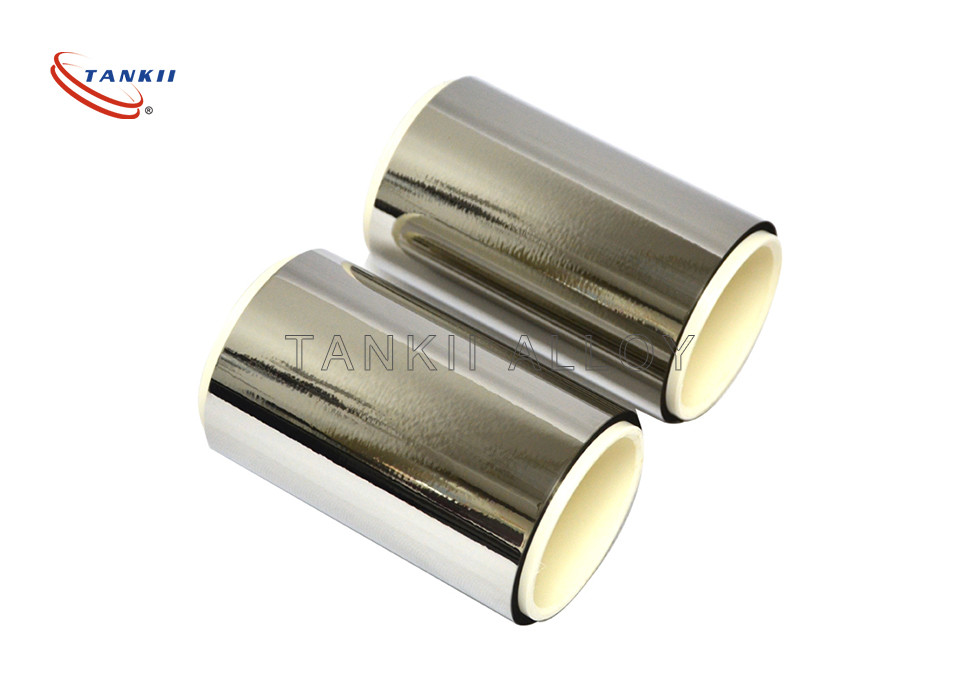Shanghai Tankii Alloy Material Co.,Ltd |
|
Verified Suppliers
|
|
0.05mm Thickness Karma Nichrome Alloy Foil Strip for Strain Gauges
Nichrome, a non-magnetic 80/20 alloy of nickel and chromium, is the most common resistance wire for heating purposes because it has a high resistivity and resistance to oxidation at high temperatures. When used as a heating element, resistance wire is usually wound into coils. One difficulty in using nichrome wire is that common tin-based electrical solder will not bond with it, so the connections to the electrical power must be made using other methods such as crimp connectors or screw terminals.
Kanthal (Alloy 875/815), a family of iron-chromium-aluminium (FeCrAl) alloys used in a wide range of high-temperature applications.
Constantan [Cu55Ni45] has a low temperature coefficient of resistivity and as a copper alloy, is easily soldered. Other constant-resistance alloys include manganin [Cu86Mn12Ni2], Cupron [Cu53Ni44Mn3]and Evanohm.
The Evanohm family of nickel-chrome alloys [Ni72Cr20Mn4Al3Si1],[Ni73Cr20Cu2Al2Mn1Si], have high resistance, low temperature coefficient of resistance, low electromotive force (Galvani potential) when in contact with copper, high tensile strength, and also are very stable with regards to heat treatment.
Balco [Ni70Fe30] and similar alloys have very high, but more linear, temperature coefficient of resistivity, making them suitable for sensing elements.
Many elements and alloys have been used as resistance wire for special purposes. The table below lists the resistivity of some common materials. The resistivity of amorphous carbon actually has a range of 3.8 - 4.1 × 10−6 Ω m.
A strain gauge (also spelled strain gage) is a device used to measure strain on an object. Invented by Edward E. Simmons and Arthur C. Ruge in 1938, the most common type of strain gauge consists of an insulating flexible backing which supports a metallic foil pattern. The gauge is attached to the object by a suitable adhesive, such as cyanoacrylate. As the object is deformed, the foil is deformed, causing its electrical resistance to change. This resistance change, usually measured using a Wheatstone bridge, is related to the strain by the quantity known as the gauge factor.
A strain gauge takes advantage of the physical property of electrical conductance and its dependence on the conductor's geometry. When an electrical conductor is stretched within the limits of its elasticity such that it does not break or permanently deform, it will become narrower and longer, which increases its electrical resistance end-to-end. Conversely, when a conductor is compressed such that it does not buckle, it will broaden and shorten, which decreases its electrical resistance end-to-end. From the measured electrical resistance of the strain gauge, the amount of induced stress may be inferred.
A typical strain gauge arranges a long, thin conductive strip in a zig-zag pattern of parallel lines. This does not increase the sensitivity, since the percentage change in resistance for a given strain for the entire zig-zag is the same as for any single trace. A single linear trace would have to be extremely thin, hence liable to overheating (which would change its resistance and cause it to expand), or would need to be operated at a much lower voltage, making it difficult to measure resistance changes accurately.

